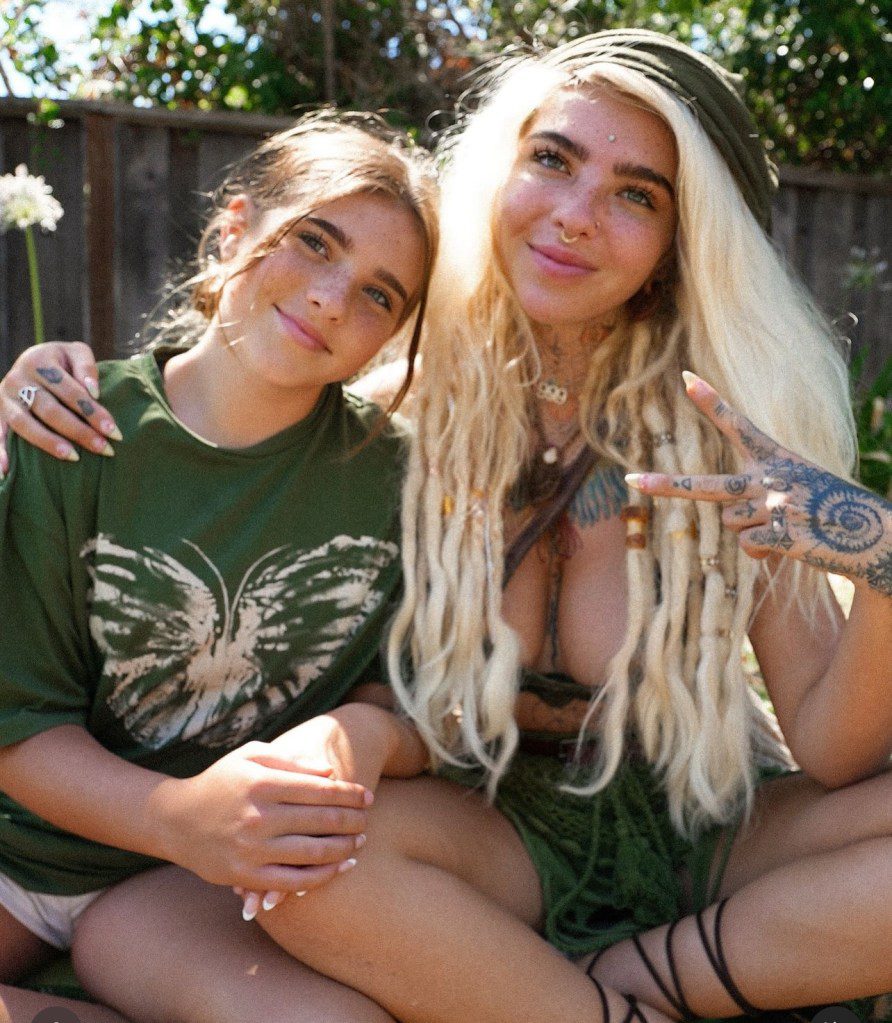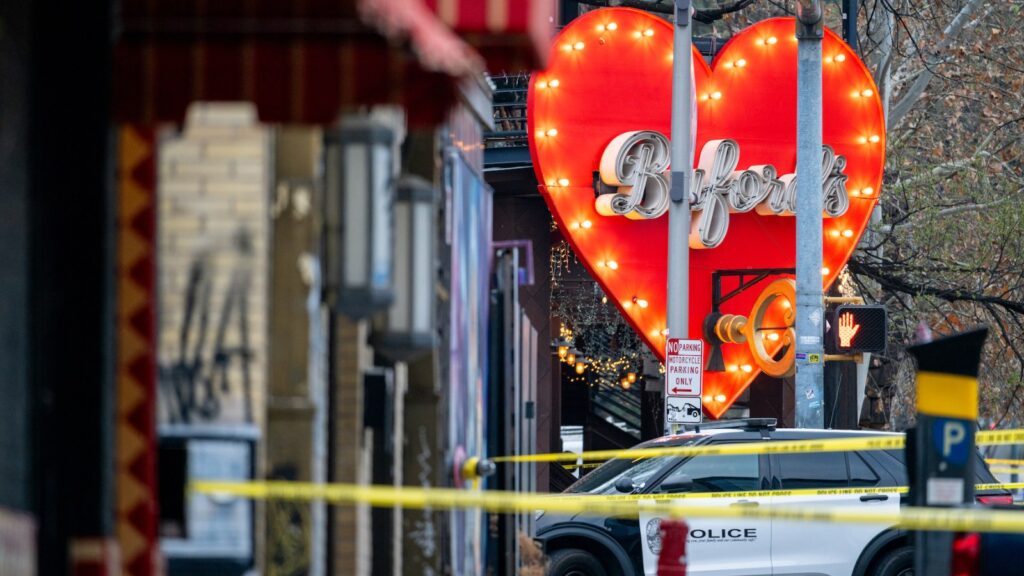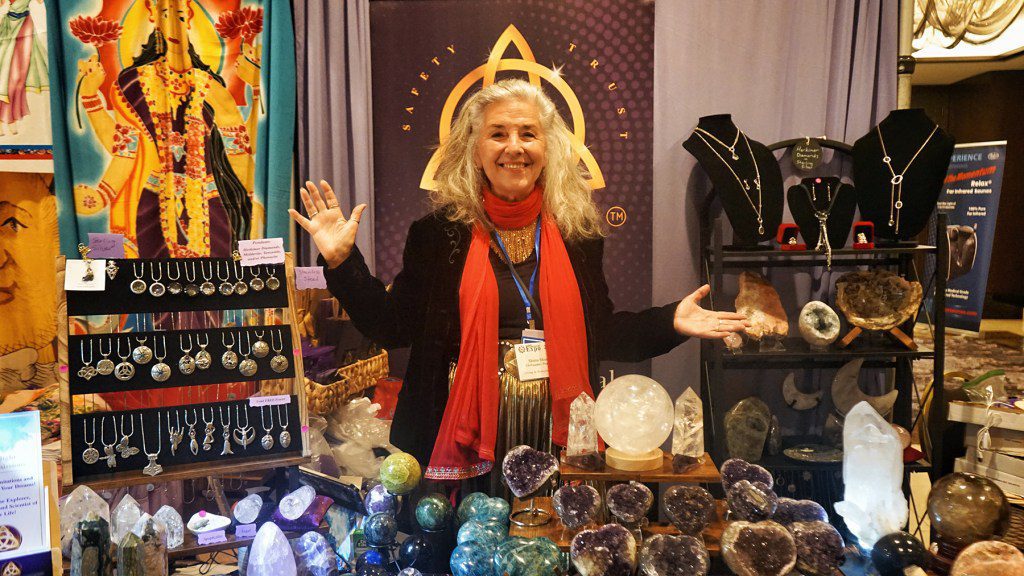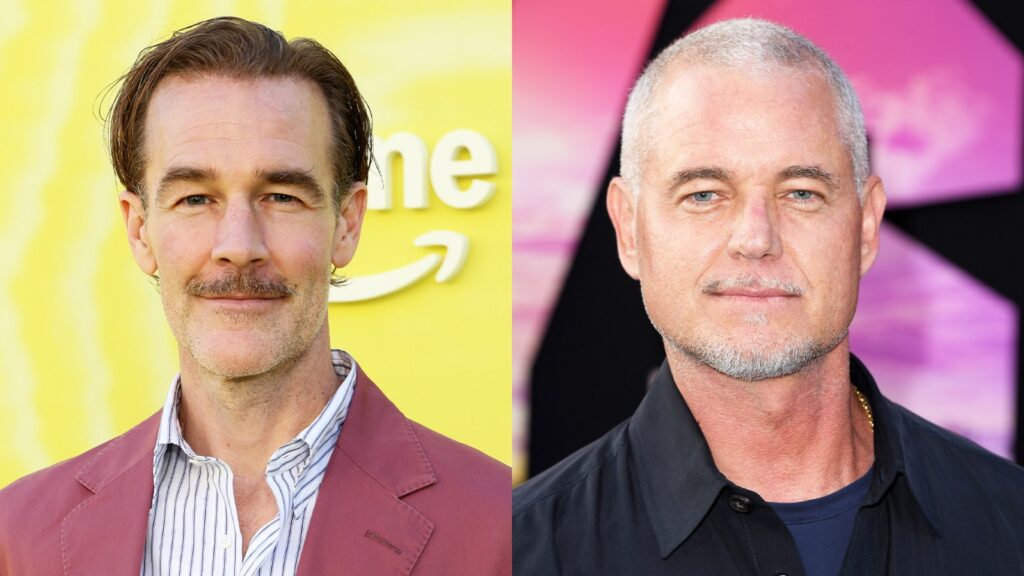Is Shanin Blake, the ‘Alien Conspiracist E-Girl,’ for Real?
“I’ve been chilling in the mountains of Peru/Drinking ayahuasca with the shamans too/Cup of San Pedro to shift the mood,” Shanin Blake croons over a smooth, R&B-inflected groove. She’s got a giant mass of platinum blonde dreads and she’s wearing a white crocheted bikini top, a wide-brimmed hat, and an assortment of beaded necklaces; in short, she looks exactly like the type of person you’d expect to write a song about drinking ayahuasca in Peru.
In the March clip from “Peru Song,” Blake, 30, proceeds to reference a number of conspiracy theories in rapid fire: that she’s been “learning shit from the aliens,” how “we’re all connected to the pyramids,” and that we “used to use them for time traveling.” At one point, she claims to have healed a kidney infection with her mind. The comments on the video, which has 3.5 million views, are largely scathing: “Colonialism’s final boss” reads one with almost 6,000 likes, while another says, “Normalize just being like an accountant or something.” Some of the commenters accuse her of experiencing some form of spiritual psychosis, while others characterize her as a “Trustafarian,” or a wealthy white person cosplaying as someone who embraces Indigenous traditions.
Given the opprobrium surrounding “Peru Song,” when I ask her about it during a recent interview, I’m anticipating she’ll be on the defensive. I sort of expect her to say the lyrics are a metaphor that are only vaguely supposed to represent some type of real-world experience she had. As it turns out, I am half-right. “It’s literally a diary entry of an experience that I had when I did ayahuasca and San Pedro in Peru with the shamans there,” Blake says, telling me about a retreat she hosted there last year to raise funds for a local child’s surgery. “That song really just came from everything I felt like I learned there, and just wanting to share that with my audience.” Of the reference to healing her kidney infection specifically, she says that is also a reference to a personal experience she had a few years ago, during a different ayahuasca trip. “That’s when I realized how powerful ayahuasca could be,” she adds. “And in my songs, I’m just putting things together, connecting the dots.”
There is, of course, no evidence that ayahuasca can heal a kidney infection, just as there is no basis for the fringe theory that the pyramids are the result of ancient civilizations time traveling. But for Blake, that’s beside the point. “This is my art, and this is how I express what I go through,” she says. “I’m never telling anyone what to do — I never say in the song, ‘Hey, don’t use antibiotics.’ You do you, boo-boo. My music is for me, and I’m just putting it out.” (It’s also, to be fair, quite catchy: while writing this, I caught myself singing the lyrics at my desk more than once.)
Blake is a musician and creator based in California who specializes in what she refers to as “affirmation music,” which she defines as “self-empowering songs that “share different types of modalities I’ve learned, such as manifestation or law of attraction.” She’s also among the most reviled creators on TikTok. On her videos, commenters regularly barrage her with insults, calling her “Hippy Barbie” or accusing her of culturally appropriating Black neo-soul artists like Erykah Badu. (Blake says she’s a fan, but denies mimicking her sound: “Your music will reflect the people that you love. I have a lot of artists I love. They’re all gonna be reflected in my music. That’s what music is.”) One recurring comment alleges that her father works at the military defense firm Lockheed Martin. This is not, in fact, true: Blake’s mother previously worked as a vocational counselor, while her father is a contract pilot (I was able to verify this via public records). She doesn’t know where that particular rumor came from. “The first time I saw it, I didn’t even know what Lockheed Martin was,” she says. “Me and my best friend had to look it up. It’s a gun company, right? Or something to do with weapons?”
Yet despite the intense criticism she attracts on TikTok, Blake’s fan base has exploded. On Instagram, her following of “shroomies” — her term for her stans — has increased more than sevenfold from a little more than 181,000 in August 2023 to more than 1.4 million as of this writing, according to SocialBlade data. Over the past year, her TikTok following has tripled, from a little more than 250,000 followers in July 2023 to 880,000 today. She has launched a national tour off her social media notoriety, with dates at clubs and venues in cities across the country over the next year, and she says she is also being featured in a documentary, which she says focuses on “spiritual people in the internet realm.” “I just try to focus on my life, my happiness, my family, and my goals, and being authentic to myself,” she says of receiving constant internet backlash. “And if somebody hates me for that, that’s not my responsibility.”
Given the amount of notoriety surrounding her online presence, Blake rarely gives interviews. “I try to be really particular with what I put out about myself,” she says. “There’s so much that’s being said about me constantly. And so when I finally do have something put out about me, I just wanted it to feel more” — she pauses, searching for the right word — “official.” Contrary to the rumors about her being a privileged trust fund baby, however, she had something of a hardscrabble childhood: she was born in Idaho, moving to Utah as a small child with her brother and her parents, who eventually got divorced. She had a deeply fractious relationship with her father, who she says she no longer speaks to. “There was a lot of trauma that he inflicted in my life from a very young age,” she says. “I was very angry at him for a very long time. I’m older now, so I’m like, ‘I forgive you and I love you from a distance.’ But I don’t get too close, because that’s when shit starts getting weird.”
Blake and her daughter.
Courtesy of Shanin Blake
When Blake was 17, she became pregnant with her daughter, who is now 12 and who regularly makes appearances on Blake’s social media platforms. Becoming a teen mother, she says, was “really scary”: “I faced a lot of judgment and hate,” she says. The father of her baby, whom she met when she was 14, was no longer in the picture, and her mother and father both strongly disapproved of her pregnancy, with her father, who had just gifted her with a used car, threatening to withdraw the loan payments if she chose to carry to term, Blake says. She chose to keep the pregnancy, graduating from high school early and moving into her mother’s basement with her infant daughter when she was 18.
During her daughter’s infancy, Blake worked at Best Buy and went to massage school to get her license, selling weed brownies on the side to make ends meet. At one time, she says, she and her daughter were on food stamps. “There was a point where we were just living off of canned food,” she says. “And I was like, this is not the way I want to live.” She sold her few belongings, bought a van, and traveled to Humboldt County to work as a weed trimmer, which she says allowed her to make money and care for her daughter while she worked in the fields. “It was a really cool lifestyle,” she says. “And I feel really grateful for that time I got to spend with her.”
To hear Blake tell it, music had always been a part of her life: she grew up listening to doo-wop and 1960s psychedelia, and she wrote her first song when she was 14, after a bad breakup. She played it for her mom while she hid in a closet, too embarrassed to have her look at her. “I was like, I need to know if I’m good or if I’m bad, because I might sound fucking horrible right now,” she recalls. “Then I started singing, and she was like, ‘That was actually really good. I didn’t even know you could sing.’” She bought a guitar and started teaching herself Jack Johnson tabs and playing coffee shops and open mics, raising $10,000 via Kickstarter to fund her first album, Soul Child, in 2011.
There are aspects of Blake’s music that have stayed consistent since she started out. The title track off her first album, while lacking the explicit references to 5G and ayahuasca retreats and pyramid time-traveling, are nonetheless fairly explicitly pro-drug and anti-establishment, with Blake crooning, “The government tells me that/I am no good/I’m a rebel at heart/I don’t do what I should/But I’m brainwashed to think/All these things in my head/But I still stay high/All the time and faded.” And she still sings in the same girlish mezzo soprano, reminiscent of an indie musician at a coffeehouse.
Other than that, however, there’s not much of a stylistic throughline connecting Blake’s early output and her neo-soul, consciousness-raising raps. There’s even less of a consistent throughline between her earlier barefoot, sun-kissed Cali aesthetic and her current style, which looks like the remnants of a nuclear meltdown at a Burning Man camp. When asked about this, Blake denies that she changed her style over the years in any significant way. “Obviously you’re going to change your aesthetic over the course of time naturally, but when you get to the foundation of my aesthetic, I think I kinda was always on this vibe,” she says.
But it’s her general tribal-inspired aesthetic, particularly her dreads, that have sparked the more ire from commenters accusing her of cultural appropriation. It’s also the one critique during our conversation that she refuses to engage with. “I think I won’t comment on that because I love dreadlocks and locs in general, and a lot of people have locs of all different races,” she says. “I’ll just leave it at that.” She says she has long been interested in plant medicine and Indigenous healing traditions, citing the shamans she met in Costa Rica and Peru as personal inspirations. “They were so kind and so inviting in sharing their practices, and wanting to help and teach and spread this message of a different way of life without pharmaceuticals,” she says.
Blake’s music career did not really take off until she started leaning more into this aesthetic on TikTok and Instagram, though she frames it as an organic shift. For years, “I kind of teetered in and out of music because it wasn’t enough money to live off of,” she says. That started to change in 2022 when she put out “Nature Song,” in which she sings in a near-whisper about taking “a little bit of acid” and “a little bit of shrooms” while feeling the sun shine on her skin. She says she mixed and mastered the track herself in an hour, and was shocked to see it blow up on social media. “There were moments in my life where I was like, ‘Oh, I should try to be different, to fit the mold of what I thought other people would want [in pop music],’” she says. “And then, really, as soon as I stopped caring about any of that shit, it was like, ‘Whoa, here’s everything and more.’”
Like “Peru Song” and subsequently released tracks “Bad Btch Energy” and “Energy Vampires,” “Nature Song” attracted a ton of hate on social media. But Blake is well aware that her infamy has been key to her success, to the degree that she is now making enough money to work as a full-time musician after years of toiling for an audience. “It’s funny — when I wasn’t really anybody, and I would put music out, I never got any hate,” she says. “Only like 1,000 people liked it or something. But everyone’s like, this is what you signed up for. Everything you do on a mainstream level is gonna get just as much hate as it does love. And I try to focus on the love, not the hate.”
Though Blake takes issue with the allegations that she is a “trust fund baby” in light of her traumatic childhood and her background as a struggling teen mom, she’s tickled by some of the false rumors circulating about her. “The funniest one was when everyone said I died at Burning Man,” she says, giggling. “There were all these articles saying that I was deceased. But I was super alive, actually.” Ultimately, Blake adopts a very Shanin Blake-esque perspective toward those who attack her on social media: she views it all with love. When she talks about how she views the haters, she cites a former Hollywood visual effects designer named Darryl Anka, who has built a following as a writer and spiritual guru by claiming to be channeling an extraterrestrial named Bashar.
“There’s this really cool quote from Bashar where he’s talking about the energetics behind love and hate and whatnot,” she says. “[This] isn’t word for word, but basically in this little clip I saw, he says: your responsibility is to love, be loved, love what you do, be happy. [If] people hate you or love you, it’s really none of your business. If my energy comes into [haters’] space, it’s because they actually attracted me into their space, whether they hate me or not. And I always thought that that was kind of a cool concept. It helped to hear.
“I love the people who love me, and I love the haters,” she adds. “They’re great, and they’re a part of the whole thing. At the end of the day, we’re all just souls in these weird bodies here on Earth, and we’re all pink on the inside. In the bigger, cosmic picture of everything, we really are just energy at the end of the day.”





